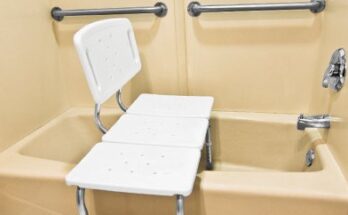Starting a bathroom remodel can excite and overwhelm you. To succeed, you need to hire the right contractor. This guide will help you find and hire a trusted bathroom remodel contractor in the United States.
Why You Need a Qualified Contractor
A bathroom renovation costs a lot. The National Kitchen and Bath Association says the average bathroom renovation in Columbus, Ohio ranges from $10,000 to $30,000. This big expense means you need to hire a pro who can turn your ideas into reality while doing quality work and following building rules.
Research and Preparation
Before you contact contractors, you should know what you want your new bathroom to look like. This planning helps you talk with possible contractors and get correct price estimates.
- Figure out your project’s scope: Decide if you want a simple update or a full makeover. Think about changes to the layout, plumbing, and electrical work.
- Make a budget that works: The National Association of Home Builders says bathrooms make up 10-15% of a home’s total value. Keep this in mind as you plan your budget, and set aside some money to deal with any surprises that might pop up during the remodel.
- List what you want: Rank the features and finishes you’d like to have. This could include things like a walk in bath and shower double sink, or floors with heating.
- Research Design Trends: Get to know what’s hot in bathroom design right now. The National Kitchen and Bath Association puts out yearly trend reports that can give you some great ideas to work with.
Finding Potential Contractors
Now that you’ve got your project outline ready, it’s time to begin looking for skilled contractors. Here are several ways to create a list of possible candidates:
- Ask people you know: Talk to friends, family, and neighbors who’ve redone their bathrooms. Their firsthand experiences can give you a good idea of a contractor’s quality of work and how they act on the job.
- Check out professional groups: Look into the National Association of the Remodeling Industry (NARI) and the National Kitchen and Bath Association (NKBA). They have lists of certified pros. These groups make sure their members follow tough rules and behave.
- Look online: Websites like Houzz, Angi, and HomeAdvisor can help you find contractors in your area and see what other customers think. The Better Business Bureau is also a great place to check a contractor’s track record.
- Visit Home Improvement Stores: Many big hardware stores have connections with contractors in your area and can suggest some names.
- Attend Home Shows: Local home and garden expos give you a chance to talk to several contractors face-to-face and see samples of what they’ve done.
Vetting Potential Contractors
After you’ve put together a list of possible contractors, it’s time to trim down your choices. This process to vet candidates plays a key role in making sure you bring on board a dependable and skilled professional.
- Check Credentials: Make sure the contractor has a license, bond, and insurance. The National Association of State Contractors Licensing Agencies says 41 states require contractors to have a license. Contact your state’s licensing board to confirm the contractor’s status.
- Review Past Work: Ask to see examples of completed bathroom remodels. Most contractors have online galleries or can show you before-and-after photos of their projects.
- Request References: Ask for contact info of previous clients, those with projects like yours. When you talk to references, ask about how well the contractor communicated, if they finished on time, and if they stayed within budget.
- Check How Long They’ve Been Around: The U.S. Small Business Administration suggests picking a contractor who’s been in the game for at least five years. This track record shows they’re stable and have dealt with all sorts of project hiccups.
- Talk to Them Face-to-Face: Set up meetings with the contractors you’re leaning towards. Seeing them in person helps you get a feel for how they communicate and carry themselves.
The Importance of Proper Documentation
After you pick a contractor, make sure you document every part of the project. This paperwork protects you and the contractor during the remodel.
- Detailed Contract: Your contract needs to describe the project, set a timeline, lay out when you’ll pay, and say how to handle changes. The Federal Trade Commission says contracts should also list the specific brands and models of materials you’ll use.
- Permits and Inspections: Make sure your contractor gets all the needed permits. The International Association of Certified Home Inspectors points out that bathroom makeovers need permits for structure changes, plumbing, and electrical work.
- Warranty Information: Talk about the contractor’s guarantee on their work and any promises from makers on materials and fixtures. The National Association of Home Builders reports that most contractors give a one-year guarantee on what they do.
- Insurance Certificates: Get copies of the contractor’s liability insurance and workers’ comp policies. This shields you from liability if accidents or property damage happen during the renovation.
Communication and Project Management
Good communication is key to make a remodeling project run. Set up clear expectations and guidelines at the start to prevent mix-ups and holdups.
- Pick a Main Contact: Choose who you’ll talk to about the project. It might be the contractor or someone managing the job.
- Set Up Regular Talks: Plan when you’ll meet to check how things are going, talk about any issues, and make choices. The Remodelers Council of the National Association of Home Builders thinks weekly meetings work well for most jobs.
- Write Down Decisions: Keep a list of all the choices you make during the project, like what products you pick and any changes to the design. This list can help avoid mix-ups and give both you and the contractor something to look back at.
- Get to know the Payment Schedule: Don’t pay the full amount upfront. Studies show a reasonable down payment is 10% of the project cost or $1,000, whichever is less. You should link later payments to project milestones.
Getting Ready for the Makeover
As your bathroom project’s kickoff gets closer, you can take a few steps to make sure everything goes from day one:
- Clean Out the Space: Take out all your stuff from the bathroom and nearby areas that the construction might affect.
- Shield Your Home: Talk to your contractor about how they’ll protect other parts of your house from dust and mess. Many contractors use plastic sheets and temporary floor covers.
- Get Ready for Disruptions: Bathroom reno can mess up daily life. If it’s your only bathroom, figure out where else you can go during the work.
- Lock Up Valuables: If workers will be in other parts of your house, put away valuable items and important papers.
Keeping Tabs on the Remodel
Once work starts, stay in the loop to make sure everything goes according to plan:
- Stay Reachable: Don’t hover, but be ready to answer questions or make choices to avoid hold-ups.
- Keep a Visual Record: Snap pictures as the renovation moves along. This helps with your files and can sort out any disagreements later.
- Speak Up Right Away: If something looks off or worries you, tell your contractor . Quick talks can stop small issues from growing into big problems.
- Plan for Surprises: Bathroom makeovers often reveal hidden snags in old houses. The National Association of Home Builders suggests setting aside 10-15% of your budget to handle unexpected costs.
Project Completion and Final Steps
As you finish up your bathroom remodel, take these key steps to make sure the job ends well:
- Do a Last Check: Take a close look at everything with your contractor. Make a list of things that need fixing before you pay in full.
- Get All the Papers: Gather all the warranty info instructions on how to care for new stuff, and copies of final checks and OKs.
- Pay the Rest: When you’re happy that all the work matches what you agreed on, give your contractor the last payment.
- Share Your Thoughts: If you like the work, think about writing a good review for your contractor online. This can help other homeowners find a good pro.
Summary
Finding the best bathroom remodel contractor plays a big role in making your renovation project work. These key tips will help you feel sure about the whole process so you end up with a great-looking useful new bathroom that makes your home worth more. Keep in mind doing your homework, talking , and writing everything down are must-haves to have a good time remodeling. When you team up with the right contractor and take the right steps, you can turn your dream bathroom into real life, making your day-to-day better and boosting your home’s value overall.



